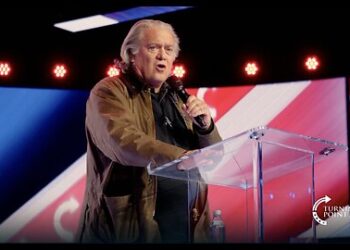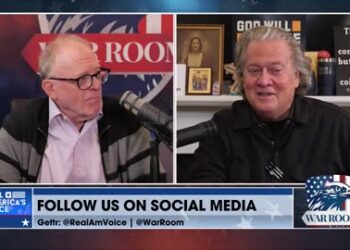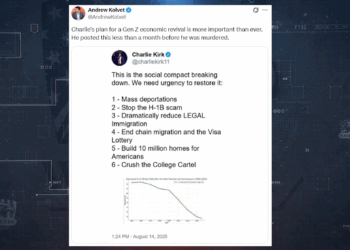Steve Bannon talked to Mark Krikorian, the executive director of the Center for Immigration Studies, an American immigration think-tank since 1995 on Friday’s WarRoom. Their discussion centered around the flaws in the H-1B visa system, which is intended to bring in skilled foreign workers to fill positions in the U.S. labor market. Despite efforts by President Trump’s administration to reform the system, including a 2017 executive order aimed at prioritizing higher-paid workers, the system remains broken.
The H-1B visa allocation process is still based on a lottery system, which often results in the selection of less qualified individuals for high-skill jobs. Although President Trump’s reforms had a strong start, they were delayed by bureaucratic inertia and were ultimately rescinded by the Biden administration. The conversation highlighted the broader implications of this flawed system on American workers, the economy, and the potential for meaningful immigration reform.
Watch a quick WarRoom clip:
Mark Krikorian On President Trump’s Historic Executive Order Ending H-1B Visa Program pic.twitter.com/WSLCGdNDn5
— Bannon’s WarRoom (@Bannons_WarRoom) December 27, 2024
Key Points from their Friday WarRoom discussion:
H-1B Visa Challenges: The H-1B visa program is designed to allow temporary skilled workers into the United States, but the way the system is structured leads to several problems. Currently, the program issues 85,000 H-1B visas annually, but it uses a random lottery system to allocate them. This means that rather than ensuring the best and brightest talent is brought in, the system often selects workers who are less qualified, filling critical roles with suboptimal candidates. This randomness is seen by many as an inefficient way to address the country’s need for skilled labor.
Trump’s Executive Order: In 2017, President Trump signed an executive order that sought to reform the H-1B visa program. The order directed the Department of Homeland Security (DHS) to implement a regulation that would prioritize the awarding of H-1B visas to individuals with the highest salary offers, ensuring that the program would benefit those who are most valuable to U.S. employers. The goal was to shift from a random lottery to a merit-based system that placed the highest-skilled workers in priority positions. However, despite this executive action, the regulation was delayed due to bureaucratic challenges and resistance within the White House, and it was not finalized until late in Trump’s administration.
The Disney Controversy: One of the most notable cases that brought public attention to the H-1B visa issue was the controversy at Disney, where American workers were forced to train foreign H-1B workers who were brought in to take their jobs. This sparked a major backlash, particularly among Trump’s base, and became a key example of how the H-1B system was being misused to replace U.S. workers with cheaper labor from abroad. The incident was a major talking point in the 2016 Republican primaries, with Trump using it to highlight the flaws of the immigration system and galvanize support among voters concerned about American workers losing jobs to foreign nationals.
Reform Roadblocks: Despite efforts by Trump’s administration to push through reforms, including internal compromises among White House officials, the regulatory process faced significant roadblocks. Bureaucratic delays, legal debates over the implementation of the reforms, and resistance from certain factions within the White House meant that the reform was never fully enacted. When Joe Biden took office, his administration swiftly reversed many of Trump’s immigration policies, including the H-1B visa reforms, essentially returning to the previous system that Bannon and Krikorian argue is broken.
Global Talent vs. American Workers: Throughout the conversation, Bannon emphasized the argument that relying on foreign talent through the H-1B program is detrimental to American workers and the country’s long-term economic growth. Bannon framed the system as a form of “imperialism,” asserting that the United States should help other nations build up their economies rather than continually importing foreign workers. He stressed that such policies contribute to a global system where wealth and talent are concentrated in certain wealthy regions, leaving other parts of the world underdeveloped. While acknowledging the need for a merit-based system, Bannon also pushed for a focus on American workers and industries, rather than relying on a steady influx of foreign labor.
Why This Is Important:
The H-1B visa issue highlights a fundamental debate in U.S. immigration policy: How can the U.S. balance the need for foreign talent with protecting American workers? Bannon and Krikorian’s discussion underscores the complexity of reforming the system. The continued reliance on a lottery-based system instead of merit-based qualifications creates a disparity between the skilled labor needed and the workers selected. The challenges of reforming this system speak to the broader issue of immigration reform and the need to balance global economic integration with domestic job creation. Moreover, the H-1B visa system’s potential impact on wages and job opportunities for American workers remains a key concern, especially in an era of growing economic disparity.
Watch the full conversation between Bannon and Krikorian from Friday’s WarRoom:





